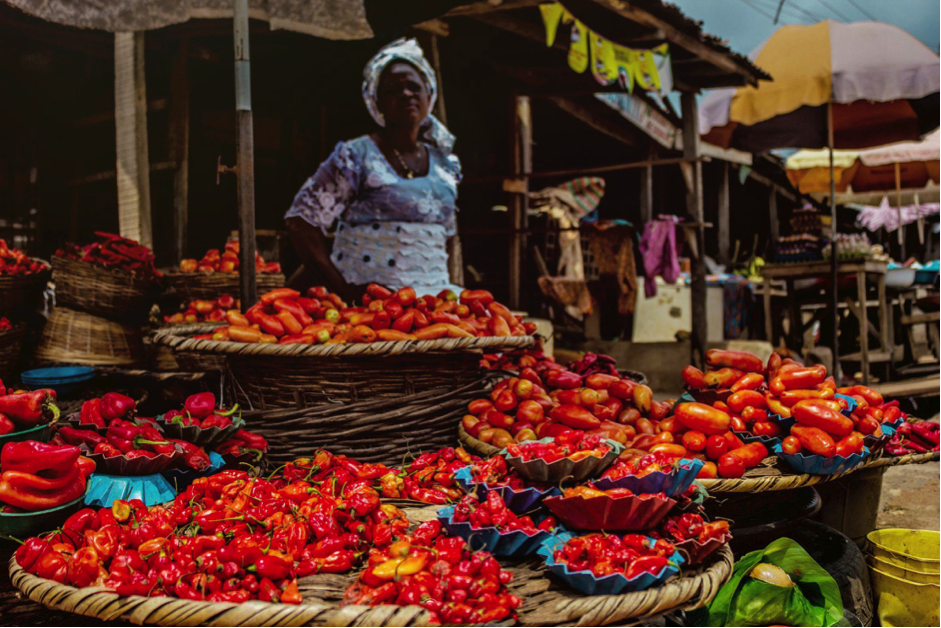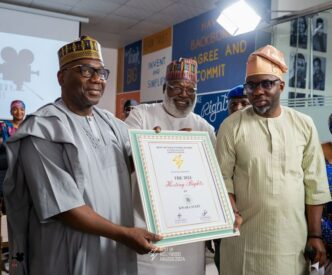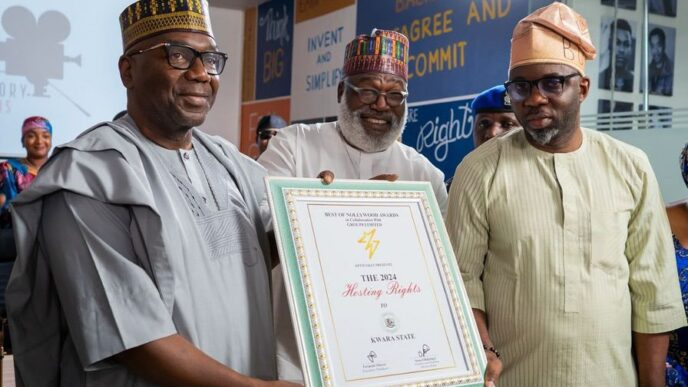BY OLUSOLA OMOLE
According to the National Agricultural Extension and Research Liaison Services (NAERLS), in the year 2024, 33 states in Nigeria experienced reduced rainfall and this led to lower crop yields and compounded pest infestations. NEMA also noted that in 2024, floods killed 303 people, displaced 673,333, and damaged 1.16 million hectares of farmland. These issues severely disrupted food production in Nigeria in the year 2024. This is why to achieve high productivity and eliminate inefficiency in 2025, there must be conscious efforts to ensure equilibrium between the private and public sectors in Nigeria’s agricultural ecosystem.
Agriculture remains the backbone of any developing economy and the foundation for rapid and sustainable growth and development of any Nation. In all climes, especially developing nations like Nigeria, the public sector is expected to be responsible for providing an enabling environment, driving policies that will make private investments in agriculture thrive and reward the respective players, but distractions from this role for political reasons are why attempts to channel direct public investments into agriculture have not been as successful as they should be in Nigeria.
In November 2024, the Federal Government of Nigeria and Fundação Getulio Vargas (FGV) of Brazil signed a Memorandum of Understanding (MOU) worth 4.3 billion dollars to advance private sector development in fertiliser production, hybrid seed technology, and agricultural finance. This is the perfect role that public-private partnerships can play, as these areas are critical areas that will boost almost all the value chain segments within the agribusiness ecosystem and assist smallholder farmers to be more productive with crop yields.
Advertisement
By December 2024, the African Development Bank Group facilitated $2.2 billion in capital mobilisation for its transformative Special Agro-Industrial Processing Zones Nigeria Phase II project during the Africa Investment Forum, and this is another applaudable development in the direction of public-private partnership. The SAPZ is an answer to questions that the private sector agribusiness drivers have been asking over the years. It was designed by the AfDB to be private-sector-led, as this is what will guarantee its success. The results are already becoming visible as its operationalisation spans across many commodities, geographical locations and farmers.
Phase II has opened more space for the involvement of more private sector players, with the backing of the government. It will also spur confidence in more players and attract FDIs and related investments from critical private sector players who have been hitherto complacent or undecided. The success of initiatives like SAPZ shows the need for localised funds that amplify international partnerships. Nigeria’s newly established National Agricultural Development Fund (NADF), designed to collaborate with development partners like the AfDB, could bridge these gaps in agricultural financing by channelling resources into modernising infrastructure and de-risking private investments. This synergy between local funds and global institutions can create a sustainable pipeline for agribusiness growth.
The above examples show ways in which the incentivisation of agriculture by the federal government can preserve food security and reduce risks for the private sector. These risks include insecurity, lack of enabling environment, inconsistency of policies, hostile economy, public sector bureaucracies etc. The current government policies are not adequate to incentivise private sector involvement in agriculture.
Advertisement
One of the recommendations to correct this anomaly is for the government at all levels to prioritise governance ahead of politics in matters concerning agriculture. Political leaders and public officeholders must also stop playing lip service to the issues of agricultural development. The unity of purpose of all stakeholders cannot also be over-emphasised including farming entrepreneurs themselves.
In the present clime, the farming enterprises that have been successful have been those who were favoured by some factors, and these factors include access to finance with low cost of funds, the involvement of agricultural experts at all levels of operations, access to relevant technology, access to certified seeds and access to industrial mechanisation equipment.
Smallholder farmers who have been successful have been those who stopped working in isolation but worked in groups or cooperatives with common geographical locations and commodities in order to take advantage of synergy and be able to attract the required assistance from the government and donor-funded programmes. Small agribusinesses in Nigeria can grow into sustainable large-scale enterprises by adopting cost mitigation techniques in an effort to reduce operational costs and invest more in more of capital expenditures, engaging in secured and centralised digital marketplaces to access a wider pool of buyers, suppliers, and service providers, and by adopting efficient logistics and distribution channels. Access to long-term financing, digitising record-keeping, and the implementation of precision agriculture are also tested and trusted strategies.
International organisations like the AFDB, FAO, etc can also enhance private sector participation in agriculture in Nigeria by providing funds for specific value chain operations and leading every other stakeholder in creating and driving a blueprint for agribusiness successes. Sceptical private-sector agribusiness players have been able to adopt models created by international organisations in financing their programmes/projects. These models are usually devoid of bureaucracies, lack of transparency, lack of corrupt tendencies etc.
Advertisement
International partnerships or development finance institutions ensure long-term impacts on agricultural transformations by ensuring critical success factors like identifying potential issues around operations, taking corrective actions and building trust with stakeholders; thereby ensuring long-term success. It also includes increased productivity, value addition, market access etc.
Nigeria’s agricultural policies need to begin to better coordinate agricultural sub-sectors in such a way as to attract multilateral agencies to want to dedicate a certain amount of funding to agricultural transformation in the country, and this is the major task of policymakers as stakeholders. The policies must also be directed at a gradual deregulation of the importation of major farm inputs; which will be able to incentivise private sector investments in local input production. Multilateral agencies can help de-risk private sector investments in agriculture by improving transparency and clarity, focusing on developmental objectives, focusing on developmental impacts, elevating the role of recipient country stakeholders and safeguarding the position of public services within the blended finance ecosystem.
Within the next decade, many new private sector agribusiness investments will spring up by both current and new players, owing to the upward trend of global food prices; and especially in Nigeria. Food inflation is at its highest level ever and market forces can help push it down when supplies of food are higher than the demand. The need for food availability, accessibility and affordability will drive private sector players to want to do more in helping to ensure food security in the country while they are also achieving their corporate objectives.
Another trend will be the blending of agriculture and technology for efficiencies and effectiveness that will lead to the maximisation of earnings. Technological innovations will help in attracting more private sector investments because of recent inventions in the areas of controlled environment agriculture, real-time weather forecasting, adoption of smart irrigation farming techniques, biotechnology and so on which make agriculture more interesting, involving and attractive.
Advertisement
This is why the Nigerian government must take seriously the protection and improvement of agricultural land resources and the preservation of the environment for sustainable agricultural production. There is also the need to establish appropriate institutions and create administrative organs to facilitate the integrated development and realisation of the country’s agricultural potential, especially to increase the national output and productivity of six priority value chains of food crops (cassava, maize, rice, soya, tomato & yam) and increase the national output and productivity of the poultry, fisheries, and dairy value chains, by ensuring adaptation to climate change.
Another goal is to reduce post-harvest losses via efficient storage, logistics, and market linkages, and promote local sourcing, value addition, and food safety. The most important of all is to ensure well-developed and integrated rural communities for agricultural development and improve security across Nigeria’s agricultural investments. These goals are not new and there are successful models from other countries that Nigeria can adapt to increase private sector involvement in agriculture. These models include contract farming, out-grower schemes, and joint ventures, and public-private partnerships stand at the heart of these models.
Advertisement
Nigerian politicians must move beyond rhetoric by backing actionable frameworks like the NADF, which institutionalises long-term funding for agriculture. If the government can commit to the NADF’s mandate, which is to address food security, job creation, and modernisation in agriculture, the government can finally meet the Maputo Declaration’s 10% budget benchmark – a target long ignored but now achievable through structured apolitical mechanisms. The establishment of institutions like the NADF has marked a turning point. The Fund can catalyse Nigeria’s shift from subsistence farming to a globally competitive sector by prioritising climate adaptation, rural integration, and partnerships with tech-driven agribusiness. Just as Brazil’s FGV partnership and SAPZ have shown, blending public oversight with private agility (supported by NADF’s financial backbone) will unlock the latent potential of Nigeria’s agriculture sector.
Olusola Omole, a chartered accountant, entrepreneur, and agribusiness expert, is a managing partner of AgLane Nigeria Limited. He is available at [email protected]
Advertisement
Views expressed by contributors are strictly personal and not of TheCable.
Add a comment










